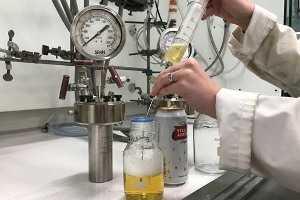Dec 7 2017
It is a commonly accepted fact that there is an urgent requirement for sustainable alternatives to fossil fuels for transportation to replace petrol and diesel.
 Credit: University of Bristol
Credit: University of Bristol
One of the most extensively used sustainable alternatives to petrol all over the world is bioethanol - in the United States gasoline is usually sold as a blend with up to 10% ethanol.
Another established fact is that ethanol is not a perfect replacement for petrol as it has problems such as lower energy density, it can be fairly corrosive to engines and it mixes very easily with water.
Butanol is a much better fuel alternative, but it is difficult to produce from sustainable sources.
Scientists from the University of Bristol’s School of Chemistry have been working for a number of years to come up with a technology capable of transforming widely-available ethanol into butanol.
This has already been confirmed in laboratory conditions with dry, pure ethanol, however, if this technology has to be scaled up, it will have to operate with real ethanol fermentation broths.
These comprise of an increasing amount of water (about 90%) and various other impurities, hence the new technology has to be developed in order to tolerate that.
Professor Duncan Wass, whose team headed the research, said, "The alcohol in alcoholic drinks is actually ethanol - exactly the same molecule that we want to convert into butanol as a petrol replacement."
So alcoholic drinks are an ideal model for industrial ethanol fermentation broths - ethanol for fuel is essentially made using a brewing process. If our technology works with alcoholic drinks (especially beer which is the best model) then it shows it has the potential to be scaled up to make butanol as a petrol replacement on an industrial scale.
Professor Duncan Wass, The University of Bristol
The technology employed for converting ethanol into butanol is known as a catalyst – these are chemicals capable of speeding up and controlling a chemical reaction and are already extensively used in the petrochemical industry.
The Bristol team’s main finding is that their catalysts will be able to convert beer (or more precisely, the ethanol present in beer) into butanol.
While demonstrating that catalysts work with a ‘real’ ethanol mixture, the team has also proven a vital step in scaling this technology up to industrial application.
Professor Wass added, "We wouldn’t actually want to use beer on an industrial scale and compete with potential food crops."
But there are ways to obtain ethanol for fuel from fermentation that produce something that chemically is very much like beer - so beer is an excellent readily available model to test our technology.
Professor Duncan Wass
Another benefit of using this approach is that it is relatively similar to a number of the existing petrochemical processes.
The next step with regards to application is to build this huge scale process and, based on earlier processes, this could take a long period of almost five years even if everything went well. The team is presently trying to comprehend what makes their catalysts so successful from a scientific point of view.
Professor Wass said, "Turning beer into petrol was a bit of fun, and something to do with the leftovers of the lab Christmas party, but it has a serious point."
Beer is actually an excellent model for the mixture of chemicals we would need to use in a real industrial process, so it shows this technology is one step closer to reality.
Professor Duncan Wass